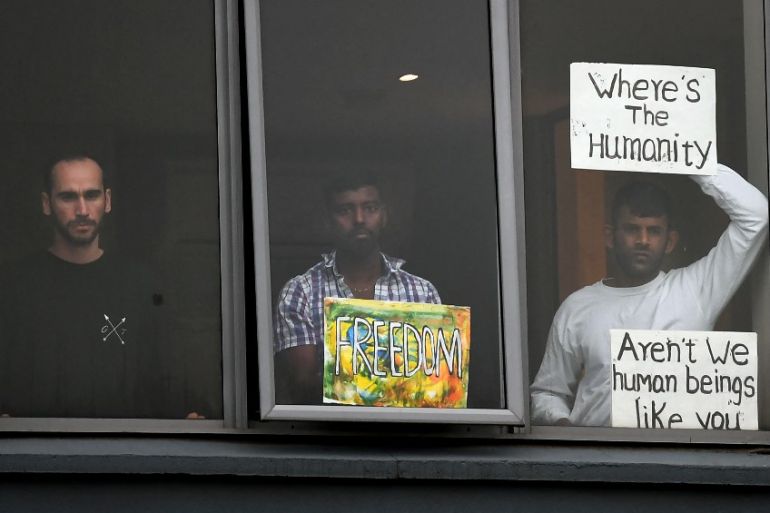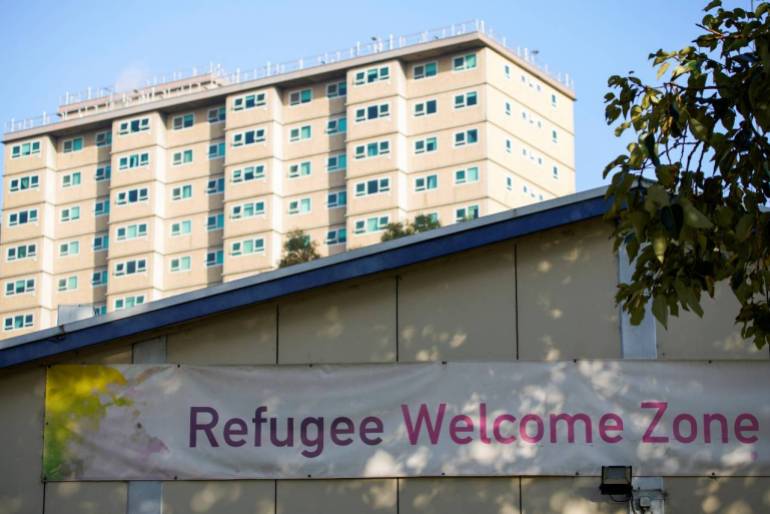Six refugees granted visas in Australia but ordeal far from over
At least 75 other refugees who are now inside Australia are still languishing behind bars facing an uncertain future.

Six more refugees in Australia have been granted visas and released from immigration detention, giving them temporary freedom as they fight to stay or seek a more permanent home in a third country.
The Department of Home Affairs granted visas to all six men, five of whom were held in a Melbourne detention facility at Park Hotel, which became a hotspot for COVID-19 infections.
Keep reading
list of 3 itemsRefugee suicide attempts up on Manus after Australia election
Behrouz Boochani leaves Manus Island after six years, lands in NZ
A sixth refugee was held in a separate detention centre in Brisbane.
All six were released on a special visa category, which would allow them to stay temporarily in Australia while they made arrangements to leave the country. They were previously held in detention centres in the Pacific and were later medically evacuated to Australia in 2019.
The visas granted to them are not pathways to permanent resettlement in Australia. But when they expire, the refugees can apply to have them extended.
One of the refugees, Jeeva, told Al Jazeera that he is still in shock after learning of his release. His name has been changed to protect his privacy.
“[Wednesday] afternoon [at] one o’clock I knew,” he recalled. “They just told me [that] ‘the minister approved [my visa] so we’re going to set you [free].'”
Jeeva was given 45 minutes to pack before he was taken to the Melbourne Immigration Transit Accommodation (MITA) to collect the rest of his belongings, and finally dropped at a hotel.
“Words cannot describe” freedom, he said, adding that he can finally breathe some fresh air and walk without security guards.
“I will eat my traditional food,” Jeeva said, adding that he could not cook his native Sri Lankan food while in detention.
‘Easier to release them’
The timing of the release could not have been a coincidence, according to lawyer Noeline Balasanthiran Harendran. Harendran and colleague Daniel Taylor represented the six refugees.
A similar situation happened in November, when three of Harendran and Taylor’s clients were also granted bridging visas, just days before their hearings.
Harendran said that in both cases the government likely found it easier to give the Medevac refugees visas rather than respond to the arguments she and Taylor presented.
The case all rests on a simple requirement under international law for the Australian government to assess the safety of returning the refugees to the regional processing countries: Manus Island in Papua New Guinea, and Nauru.
The refugees who were released had all been held previously in Australia’s notorious regional processing system in the Pacific, before they were brought to detention onshore in Australia under Medevac, a short-lived medical evacuation scheme.

They were at risk of being sent back to regional processing, a system that has been widely condemned as seriously unsafe, so they were filing for the right to a non-refoulement assessment prior to being transferred. Refoulement is the act of forcible return of refugees to a country where they could be subjected to persecution.
Such an assessment is an obligation under the 1951 Refugee Convention, to which Australia is a signatory, Harendran explained.
“If a person is fearful for their life, we need to give them an assessment,” she said.
“A procedurally fair assessment, where my client is given a safe and secure method to speak, where he’s legally represented, where he has an interpreter, and where there’s judicial review.”
Instead, the government granted all six refugees visas.
‘Elephant in the room’
The elephant in the room, Harendran said, is what these releases say about the government’s confidence in regional processing itself.
“Clearly, there is some problem with regional processing if you don’t want to do non-refoulement assessments,” said Harendran.
If even one non-refoulement assessment is made and Nauru and PNG are evaluated as unsafe for that individual, she said, it could mean the end for regional processing.
“[It] would mean that Nauru and PNG would not be a safe place for us to send our refugees,” she explained.
For now, just freedom
But in the immediate future, said Harendran, the goal is simply to achieve freedom for her remaining clients.
She and Taylor are preparing another set of cases to be filed within the next month, with the same argument.
Meanwhile, 75 of the Medevac refugees who were held in regional processing are now onshore in Australia but are still languishing behind bars.
A refugee still detained in Park Hotel, Mehdi Ali, recalled one of the refugees released on Wednesday crying as he left.
“I was like, ‘What’s wrong? Don’t cry, man,’ I hugged him and I said, ‘don’t cry, just go out … move on and don’t even look behind [you],'” he said.
The refugee told Ali in response that he could not be happy about his freedom when people were still inside.
Mehdi said that those left behind can only suffer.
Another refugee, Amin Afravi, who is being held at the Brisbane Immigration Transit Accommodation and Fraser Compound (BITA), said he can “feel” the pain of his fellow refugees still behind bars.
“People are actually feeling really bad,” he said. “When they see someone gets released and they are stuck in detention for no reason, and there is no explanation.”
‘They’re killing people slowly’
Al Jazeera contacted the Department of Home Affairs about the six refugees who were released on Wednesday, but a departmental spokesperson said that “the department does not comment on individual cases”.
“The Australian government’s policies have not changed and illegal maritime arrivals will not be settled in Australia.
“Individuals released from immigration detention are provided transitional support through the Status Resolution Support Services programme including caseworker support, accommodation and financial assistance.”
Meanwhile, activists are still calling for the release of all Medevac refugees like Mehdi and Amin remaining inside immigration detention.
Ian Rintoul, political activist and spokesperson for the Refugee Action Coalition, said that “as welcome as the releases are”, the lack of explanation raises anxiety and stress levels for those left behind.
“If it’s OK to free another six then it’s OK to free everybody else, there really isn’t any justification for holding the people any longer,” he said.
For now, Amin said he is just “trying to survive”, focusing on what he can control.
“They are killing people slowly in detention,” he said.
“If you lose your mind, there is nothing in this world [that] can bring back your mind. And people are losing their mind[s]. So what’s the difference between a dead body, a dead person, and someone [who has] lost his mind?”